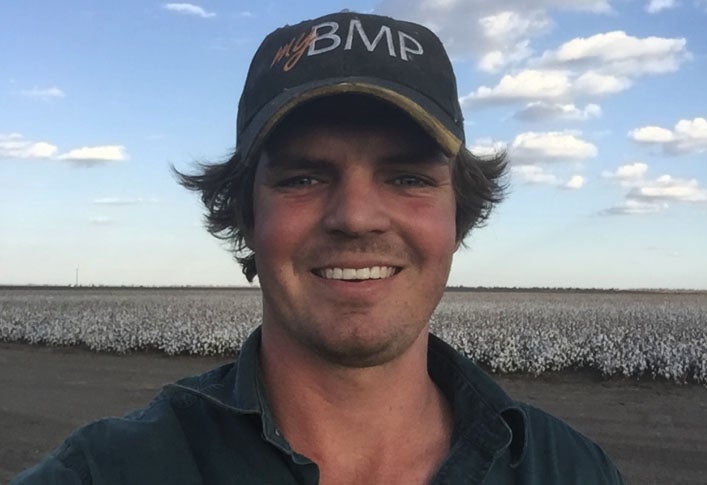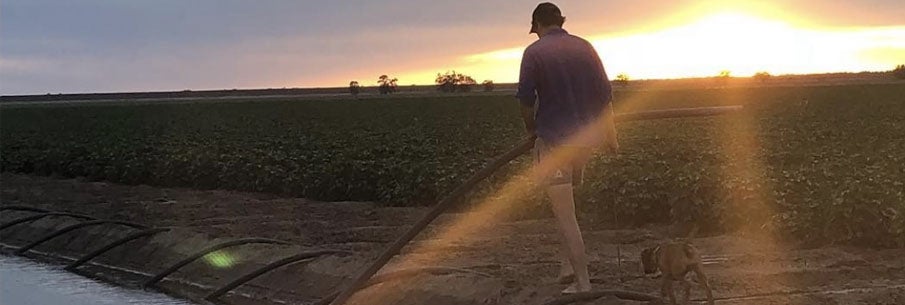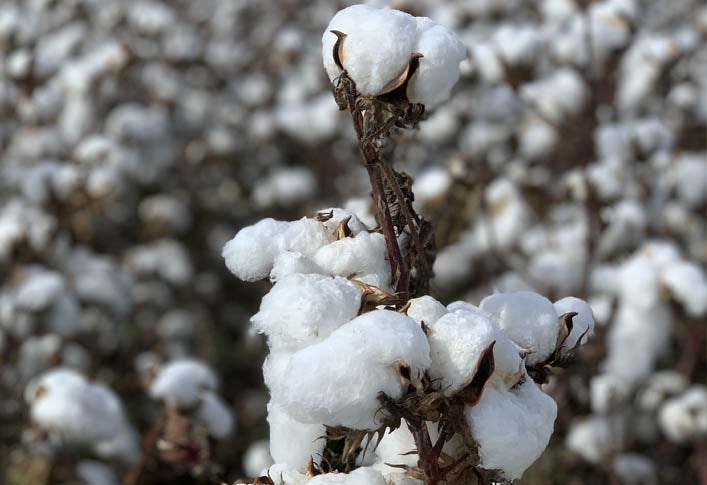Posted by on
22/06/2021
They’re a close-hovering unwelcome companion for much of the Australian summer but on the Kahl family’s Wee Waa cotton farm, some bugs and insects aren’t quite as pesky as they once were.
The family is working hard to support the natural biological balance of insects during cotton production to help promote beneficial and predatory bugs that naturally mitigate pest damage, helping drive down pesticide use and costs.
Where once a cotton crop was sprayed for bugs almost weekly, enormous industry progression has radically reduced the need for chemical intervention and Sam Kahl is extremely proud of the fact that this season, for the first time ever, the family has grown its first crop without any insecticide use at all.
“This year we had really great cotton growing conditions, a mild summer with only a couple of days over 40 degrees and good timely rain,” Sam said. “We were able to really build up our beneficial bugs such as spiders and wasps and they naturally kept down the pests that damage the crop such as mirids and green vegetable bugs.”
“We have an on-farm agronomist, Tim Brooker, who physically checks the crop twice a week for pests and ensures that the threshold of beneficial bugs outweighing damaging pests is maintained.”
A spider every metre, he said, was a good sign.
Their Integrated Pest Management strategy does include a crop oil spray, however this is non-toxic and used as an additional, slippery deterrent for mirids resting on the crop leaves.
Areas of native vegetation close to cropping developments also allowed birds and bats to play their part in the system, also preying on pests.
The third-generation operation ‘Merced Farming’ is named after the Californian region in which Sam’s late grandfather, Paul Kahl, originated, and comprises of 3,500 hectares of irrigated farming plus broadacre cropping and a 300-cow herd of Angus cattle.
Paul was one of the founders of the Australian cotton industry, identifying the opportunity in Australia – and North West NSW in particular.
And the current crop of Kahls are equally progressive – crop production is managed by 29-year-old Sam, brother Daniel, 31, is in charge of marketing, younger brother Matt, 28, is a skilled on-farm mechanic and their parents James – the managing director – and Rose also remain heavily involved.
During the course of the three generations cotton production has enjoyed enormous efficiency gains, with the Kahls consistently on the forefront of innovation.
“Since 1996 Australia has been able to grow Bollgard cotton, a genetically modified plant that is resistant to heliothis caterpillar – which had been one of cotton’s largest threats,” Sam explained.
“Cotton producers no longer need to spray for heliothis and aerial chemical output has greatly reduced. We were generally only spraying two to three times a season, which was great, so it’s really exciting to now be at a point where integrated pest management could negate the need for any insecticide use at all.”

Water-use efficiency has also advanced. Where once in-crop irrigation would occur every eight days, now watering turn-around times are about every 12 days – totalling about eight waters per season.
“This year, due to the mild season we naturally used less water, with only five in-crop irrigations,” he said.
To help build plant resilience, Sam said he ‘stretches out’ watering after the initial October water – waiting until late December to allow the plant to set a deep root system.
“We’re fortunate in this region to have self-mulching clay soils which helps establish a strong, deep root system so plants don’t need to rely on constant watering.”
And preferably, he laughs, watering is held off until after Christmas so the family can enjoy a few festivities.
The same theory is applied to their Integrated Pest Management strategy – the crop is left to ‘fend for itself’ in the early months as the insect kingdom finds its natural balance, and while plants may suffer some insect damage in the early weeks, this is offset by the opportunity it creates for beneficial bugs to build up.
“Too much water or insecticide at the beginning of a plant cycle starts a nasty cycle – a cotton plant definitely doesn’t need to be wrapped in cotton wool!”
“Cotton is extremely resilient – and some tough love at the start does wonders for the plant and the environment.”
Natural vegetation across their property, “Glencoe”, helps further promote biodiversity and rotational cropping – where water is also allocated to alternative crops such as mung beans – helps build organic matter, building soil carbon levels and returning nutrients to the soil.
The benefits of these practices means the whole operation, he said, was able to operate with negative carbon emissions.
Such is the Kahl family’s dedication to the sustainability of agriculture, it has recently partnered with Landcare and Country Road as part of The Biodiversity Project, whereby 30 acres of riverbed is now fenced, trees planted and ecosystems restored.
“It’s an exciting collaboration, helping rejuvenate the riverbank and restore important habitats across our unique river country,” Sam said.
Having travelled through a number of US cotton producing regions, Sam genuinely believes Australian cotton is the most sustainable in the world – ‘we breed the best cotton varieties that produce a lot more yield for far less water’.

And this increased efficiency is now data-driven, with cotton producers heavily audited on criteria such as energy use and water use to meet ‘My BMP’ (Best Management Practice) accreditation.
Improved standards in cotton farming are now also woven onto the consumer level with a number of global brands such as H&M, Gap and Country Road including a ‘BCI’ (Better Cotton Initiative) sticker, identifying sustainably grown cotton.
The Kahls recently picked this year’s cotton – and whilst a smaller planting – Sam said it enjoyed excellent quality and strong yields and recent significant rain across the region has filled storage dams to help ensure next season’s crop.
“There’s a snow pack melting at Niangala in the Northern Tablelands feeding into our catchment, which isn’t a regular occurrence, so it feels like a different weather pattern which is really exciting – we haven’t had a full plant since 2017 and it’s great to be back in business producing quality Australian cotton, more efficiently and sustainably than ever before.”
Thank you Kahl family for driving progression in the cotton industry, so that people around the world can wear Australian cotton with pride.
